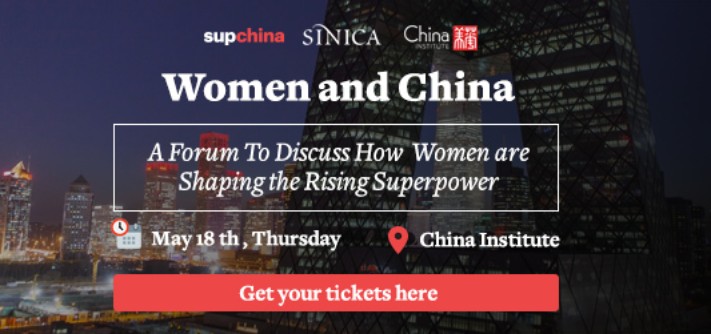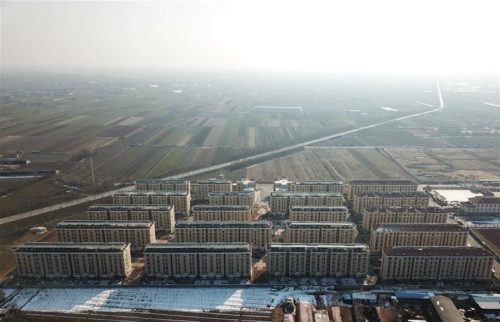He fled from Bo Xilai; now he wants to make 300,000 electric cars in China
Top China news for April 20, 2017. Get this daily digest delivered to your inbox by signing up at supchina.com/subscribe.

An electric car that can travel 600 miles on a single charge?
Many successful Chinese businesspeople have led colorful lives. Recently, the media has been fixated on Xiao Jianhua 肖建华, the tycoon who was apparently spirited away from his luxury Hong Kong apartment by mainland security agents in January, and Guo Wengui 郭文贵, the businessman China has asked Interpol to catch and repatriate as he alleges corruption in high places in China from his U.S. residence. But today the South China Morning Post profiled another fascinating character: Yang Rong 仰融, aka Benjamin Yeung Yung, who controls Hybrid Kinetic, a company that aims to “produce up to 300,000 new-energy vehicles within three years.” The company says the cars will use technology that makes a range of 1,000 kilometers (620 miles) possible on each electric charge.
Yang was a key founder of Brilliance Auto, the “biggest maker of minivans in China during the early 2000s,” which earned him a fortune estimated by Forbes at 30 billion yuan ($4.35 billion), the SCMP profile explains. But within a year, he lost control of the company when he got into a dispute with then-governor of Liaoning Bo Xilai “over a plan to locate Brilliance’s proposed BMW venture in Ningbo, close to Shanghai.” Yang had to flee China after the government issued a warrant for his arrest on charges of embezzlement. He cooled his heels in California, eventually founding Hybrid Kinetic, which is listed on the Hong Kong Stock Exchange. It is not clear from media reports if there is still a warrant for his arrest, but it was probably canceled after the fall of Bo Xilai.
China’s first cargo spacecraft
China launched its first cargo spacecraft, the Tianzhou-1 (pictured above), on April 20, from Wenchang Space Launch Center on the southern island province of Hainan. Xinhua News Agency has video footage of the blastoff with English commentary here. Xinhua says that “China aims to build a permanent space station that is expected to orbit for at least 10 years, and the debut of the cargo ship is important as it acts as a courier to help maintain the space station.”
Beijing targets live streaming and news apps on Apple App Store
Bloomberg reports that “the city of Beijing’s Cyberspace Administration is summoning Apple to ask that it subject Chinese news and live-streaming services to more stringent app reviews to ensure they conform to regulations.”
Live streaming has become one of the most popular types of entertainment on the Chinese internet, with more than 344 million people using such services at the end of last year. See The China Project’s video explainer by Jia Guo: Live video feeds are hot — sometimes too hot for the government.
Long-form writing in Chinese
In January, we published a story by Tabitha Speelman about the booming business of creative nonfiction and long-form journalism in China. Tabitha has now started a regular email newsletter called Changpian, which summarizes in English and publishes excerpts from some of the more interesting nonfiction and opinion writing in the People’s Republic.
Taiwan government wants foreign interns
On April 18, we noted that as part of an effort to attract foreign talent to the workforce, China was adjusting procedures for “green cards,” which are essentially 10-year permanent residence visas. The Taiwanese government seems to have similar ideas: The island has passed a draft bill that will make it easier for foreign students and fresh graduates to take up internships and employment. Taiwan’s China Post says that “fresh graduates would be eligible to work if they graduated from one of the world’s top 500 universities.”
—Jeremy Goldkorn, Editor-in-Chief
Sinica Podcast: What actually happened at Mar-a-Lago?
Susan Thornton, acting assistant secretary of state for East Asian and Pacific affairs at the U.S. State Department, speaks with Jeremy and Kaiser on the development and current status of U.S.-China relations.
Live streaming in China
Live video feeds are hot — sometimes too hot for the government. Jia Guo has a video report.
This issue of the The China Project newsletter was produced by Sky Canaves, Lucas Niewenhuis, Jia Guo, and Jiayun Feng. More China stories worth your time are curated below, with the most important ones at the top of each section.
BUSINESS AND TECHNOLOGY:
The Huishan collapse and the Big Four auditing firms
When Huishan, one of China’s leading dairy companies, lost 85 percent of its stock value at the end of March this year, it didn’t take long for Bloomberg to declare it a “poster child for weak corporate governance” and note the dangers of corporate debt in China. One writer in a piece for Sixth Tone, however, is now pointing the finger in a different direction: American auditing firms. Li Guangshou 黎光寿 writes, “KPMG, one of the world’s ‘Big Four’ accounting firms…had approved Huishan’s past three annual reports,” but “to date few have asked a key question: Why did a Big Four accountancy firm, with its scope and prestige, fail to detect fraud when given access to Huishan’s books?”
Huishan’s stock plunge had been preceded by Muddy Waters, an “activist hedge fund” as described (paywall) by the Financial Times, flagging Huishan as on the verge of financial collapse based on publicly available information. When it was revealed that Huishan was late in paying lenders three months later, Muddy Waters was proven correct. Therefore, Li argues, KPMG shouldn’t have given Huishan a green light, and the market dominance of the Big Four may have led to negligence.
- WeChat tipping feature runs afoul of iOS App Store rules / TechNode
“The ongoing tension between WeChat and Apple has finally gone public after the WeChat team announced a halt to the ‘tipping’ feature due to the App Store’s policy on in-app purchases.” - China’s hottest media startup worth $11 billion with new funding / Tech in Asia
A look at the Chinese news app Toutiao, which aggregates news using AI to personalize each user’s feed. The company “has reached new heights with a recent round of fundraising” that values it at around $11 billion. - China opens military contracts worth billions of yuan to private companies / SCMP
“Tenders are part of [the] drive to give private players [a] greater role in [the] defense contracting industry but lack of trust remains a problem, experts say.” - Trump authorizes investigation into steel imports from China / Axios
- China unveils $55.2 billion in tax cuts to boost growth / Caixin
- Hollywood has 1.4 billion reasons to try to play nice with China / Bloomberg
POLITICS AND CURRENT AFFAIRS:
A propaganda campaign against exiled businessman Guo Wengui
China has launched an “unusually sophisticated publicity war” against Guo Wengui 郭文贵, the billionaire residing in the U.S. making explosive allegations about corruption in the Chinese Communist Party, the South China Morning Post reported. In addition to a “red notice” from the international police organization Interpol at the request of the Chinese government, the campaign now includes a YouTube channel called “The truth about Guo Wengui” (郭文贵 真相), featuring video confessions of a man claiming to be disgraced top spy Ma Jian 马建, who makes his own bombshell accusations against Guo.
As SCMP summarizes, the man on video claims that Guo bribed him with more than 60 million yuan ($8.7 million) in gifts in exchange for “wiretapping the phone of one of Guo’s business rivals for a year, freezing a bank account, discouraging local police from investigating Guo and his company, deleting negative online media reports about Guo, and threatening a journalist from writing about the businessman.”
Other parts of the expansive propaganda campaign against Guo, Bill Bishop notes in his Sinocism newsletter, now include three pieces in the Beijing News on Guo’s alleged ties to a number of corrupt officials, plus a piece in Caixin that includes further claims of Guo and Ma’s collusion.
- President Tsai dodges another cross-strait bullet / Taiwan Sentinel
“A Chinese activist’s attempt to defect to Taiwan earlier this week could have shaken the careful balancing act that has prevailed across the Taiwan Strait since May 20 last year.” - Chinese activist who wanted asylum in Taiwan returns to China / NYT (paywall)
- China issues stricter rules for officials to report assets / Reuters
- China is building the world’s largest nuclear submarine facility / Popular Science
- Hundreds protest in Uganda capital against ‘unfair’ Chinese traders / SCMP
- Detained Hong Kong bookseller Gui wins Swedish free speech prize / Reuters
SOCIETY AND CULTURE:
Last, last, last days of old Peking
The Los Angeles Times has published an article titled “If there’s debris and destruction, it must be springtime in Beijing,” which says that “the government has embarked on a renovation project in Beijing’s centuries-old courtyard alleyways known as hútòng 胡同… Officials want to create an ‘orderly, civilized and beautiful street environment’ in these remaining alleys by rooting out unlicensed buildings and reducing clutter.” But many fear that the cleanup campaign will be done insensitively, and cause the capital to lose the slightly chaotic charm of its last remaining hutong. The article quotes Jeremiah Jenne, a historian and occasional blogger who leads walking tours through hutongs in Beijing: “The government itself is wrestling with the question of what the hutongs mean in Beijing… Are they an eyesore or a tourist attraction?”
A Weibo post (in Chinese) from the Beijing government explains the current plans for the area around Nanmencang Hutong 南门仓胡同, which is mainly to destroy all structures built without a permit and widen the alleyways. Here is a Weibo posting (in Chinese) from February with several photos showing cleanup work that was done on the Dongsi Shiyi Tiao Hutong 北京东四十一条. The Weibo account of the bookstore Zhengyang Shuju 正阳书局 has photos of bricks from Beijing’s old city walls turning up in the rubble after the destruction of illegally built structures: The city walls were mostly destroyed in 1955, and hutong residents made use of their rubble to build their own additions to their cramped hutong houses.
The Financial Times has published an article (paywall) on another big change in Beijing’s urban environment: “Beijing has announced plans to combat what it calls ‘urban diseases’ by capping its population and shrinking its footprint, wreaking havoc on the small businesses and migrants that throng its bustling streets.”
Beijing has, of course, been changing for decades. For more on previous cycles of destruction and no renovation, we can recommend these books:
- The Last Days of Old Beijing: Life in the Vanishing Backstreets of a City Transformed, by Michael Meyer about the city in the two decades leading up to the 2008 Olympics.
- Peking Story: The Last Days of Old China, by David Kidd, which describes two years that the author spent in the capital before and after the 1948 Communist takeover of the city with his wife, the daughter of a prominent Beijing family.
- China’s Road Pictures set to remake ‘Run Lola Run’ / China Film Insider
- Trafficked into wedlock: A Cambodian wife in rural China / ChinaFile
- Chinese parents are using Peppa Pig to prepare their toddlers for the Ivy League / Quartz
- Chinese park hobbles energetic street dancers / SCMP
- Review: In ‘Born in China,’ an antelope outshines a panda / NYT (paywall)
- Ultra-real China / LARB Blog







